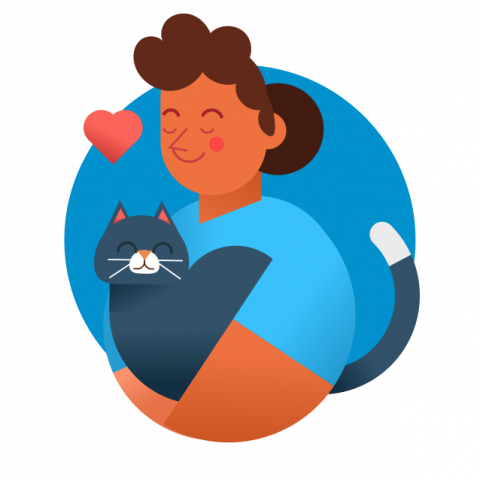What is our goal?
To reunite or rehome every adoptable animal in our care.
Where are we now?
We are achieving this goal with dogs.
We are not achieving this goal with cats, but we continue to make progress.
Perfomance highlight 2022/2023
Recent updates
We have submitted our response to the State Government's proposed (Animal Welfare Victoria) Victorian cat management strategy.
The proposed strategy has been developed following a stakeholder consultation process with local government, animal welfare organisations (including The Lost Dogs' Home) conservation groups and veterinary professionals.
The proposed strategy covers the areas of:
-
Promoting cat welfare and responsible cat ownership
-
Increasing cat desexing rates
-
Expanding cat containment
-
Reducing the impacts of semi-owned and unowned cats
-
Managing feral cat populations and impacts
-
Improving collaboration and information sharing
-
Improving laws and processes
Submissions will assist in the Victorian Government developing their final strategy.
The Lost Dogs' Home submission in response to the proposed Victorian Government Cat Management Strategy can be accessed here
As part of wider animal welfare reforms, the State Government is developing a Cat Management Strategy. Our Director of Operations represents The Lost Dogs' Home as a member of the Cat Management Working Group, a consultation committee of animal welfare representatives, providing advice to the process.
We are working ongoing with the Petstock group, to rehome cats and kittens instore. The partnership means we can extend our geographical reach and create new families beyond the boundries of our North Melbourne and Cranbourne shelters.
We are confident that we go the extra mile to reunite every lost dog or cat with its family.
Our greatest challenge, however, is being able to reunite cats. Most dogs we receive into our care are microchipped and/or their owners make contact within three days. Most cats we receive into our care are not microchipped or looked for.
As an open shelter we also receive high numbers of unsocialised cats, especially during kitten season. It is extremely challenging to rehome unsocialised cats. Unsocialised cats experience high levels of stress and trauma coming into the shelter. Severe and prolonged stress in animals is a poor welfare situation.
Longer term housing availability, especially during kitten season, is one of the keys for us to be able to tackle this problem. It takes at least 42 – 72 hours for a scared cat to settle into a shelter while a fully wild cat will not settle in this environment at all. At the height of kitten season finding housing options can be extremely challenging. Our foster program is stretched, and our rescue partners are as overwhelmed as we are.

Where do we need to be?
Maintaining our performance rehoming and adopting dogs.
Significantly reducing rates of euthanasia of cats and kittens year on year.

How will we advance?
- Deliver on low-cost microchipping and de-sexing initiatives and increase education on this issue.
- Increase collaboration and alignment of strategies with other shelter partners, RSPCA Victoria, Animal Aid, and others.
- Consider partnering with councils on trap-neuter-release programs if/when they become legal.
- Continue to monitor and reduce the length of stay between date of admission and date of adoption for all animals in our care.
- Teach responsible pet guardianship (microchipping and early desexing) of owned but also semi-owned cats, through our community outreach programs
- Promote responsible pet guardianship through our media and social media activities
- Continue to expand our foster care network and teach new skills on how to care for special needs cats and kittens: timid felines and neo-nates.
- Skill up our foster-volunteers to be able to provide long-term care for cats with high-level stress and/or anxiety issues.
- Make it possible for foster animals to be re-homed straight from their foster-homes.
- Continue expanding our capacity for rehoming cats from our Cranbourne site.
- Develop partnerships with community organisations and businesses that can contribute to our cat and kitten rehoming targets.




